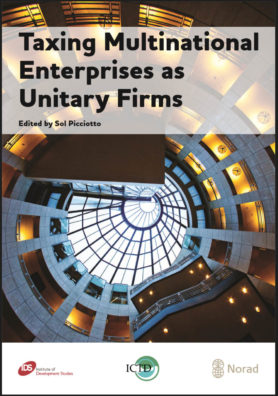The international tax system needs a paradigm shift. The rules devised over 80 years ago treat the different parts of a multinational enterprise as if they were independent entities, although they also give national tax authorities powers to adjust the accounts of these entities. This creates a perverse incentive for multinationals to create ever more complex groups in order to minimise taxes, exploiting the various definitions of the residence of legal persons and the source of income. While states may attempt to combat these strategies, they also compete to offer tax incentives, many of which facilitate such techniques to undermine other countries’ taxes.
Several alternative approaches have been identified, which start from the economic reality that multinationals operate as unitary firms. These include residence-based worldwide taxation, under which the ultimate home country of a multinational taxes its worldwide profits but with a credit for equivalent foreign taxes paid; a destination-based cash flow tax, which attributes the tax base to the country of ultimate sales to third parties; and unitary taxation with formulary apportionment, which apportions the firm’s consolidated profits according to factors reflecting its real presence in each country.
This volume outlines the nature of the problem and discusses attempts to resolve it, including the recent G20/OECD project on base erosion and profit shifting (BEPS). It then explores unitary taxation with formulary apportionment, especially from the viewpoint of developing countries. The contributions discuss how to move towards such a system starting from the current rules; the role of accounting in defining the consolidated tax base; lessons from the experience of existing formulary systems, especially in the USA; evidence from quantitative studies of tax base misalignment under current rules and the possible effects of different apportionment formulas; specific issues in the finance and extractive industries sectors; and the prospects for regional adoption.
Read the related blog, New Book Examines Alternative Approach to Taxing Multinational Companies by Tax Justice Network CEO Alex Cobham

